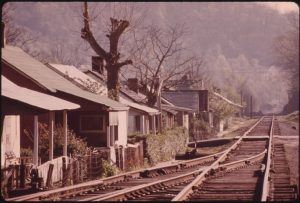Elizabeth Catte in the Boston Review:
 Political veterans such as Pelosi and Israel think that the cornerstones of the emerging left platform—housing as a human right, criminal justice reform, Medicare for all, tuition-free public colleges and trade schools, a federal jobs guarantee, abolition of U.S. Immigration and Customs Enforcement and for-profit prisons, campaign finance reform, and a Green New Deal—might perform well in urban centers but not so much elsewhere. Appalachia has become symbolic of the forces that gave us Trump. After all, his pandering to white racial anxiety did find purchase here. His fantasies to make America great again center on our dying coal industry. And the region’s conservative voters, who have been profiled endlessly, have been a reliable stand-in for all Trump voters, absorbing the outrage of progressive readers. But what Pelosi and Israel see as common sense and pragmatism can also be interpreted as tired oversimplifications and a failure of imagination.
Political veterans such as Pelosi and Israel think that the cornerstones of the emerging left platform—housing as a human right, criminal justice reform, Medicare for all, tuition-free public colleges and trade schools, a federal jobs guarantee, abolition of U.S. Immigration and Customs Enforcement and for-profit prisons, campaign finance reform, and a Green New Deal—might perform well in urban centers but not so much elsewhere. Appalachia has become symbolic of the forces that gave us Trump. After all, his pandering to white racial anxiety did find purchase here. His fantasies to make America great again center on our dying coal industry. And the region’s conservative voters, who have been profiled endlessly, have been a reliable stand-in for all Trump voters, absorbing the outrage of progressive readers. But what Pelosi and Israel see as common sense and pragmatism can also be interpreted as tired oversimplifications and a failure of imagination.
We remain attached, after all, to narratives that have worked very hard to simplify and neatly divide the state of the union: blue cities, red rural areas, a few swing suburbs. “In a period of political tumult, we grasp for quick certainties,” sociologist Arlie Russell Hochschild writes in Strangers in Their Own Land (2016). Indeed, the biggest gift that the left has given the right since 2016 is not a few avowed socialists but the myth that Trump voters are inscrutable and monolithic.
More here.
